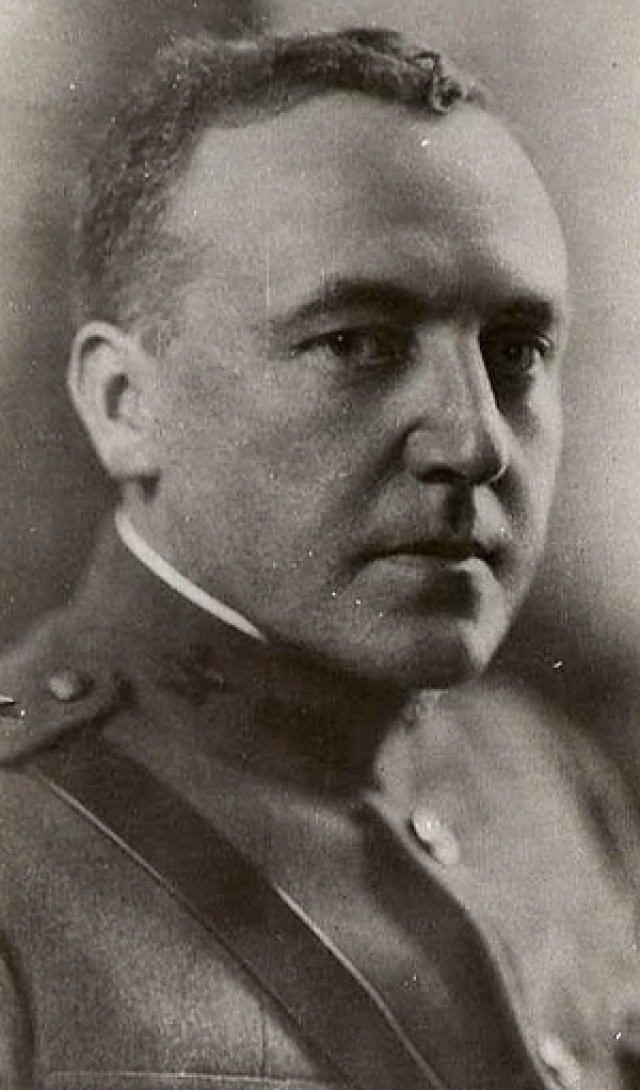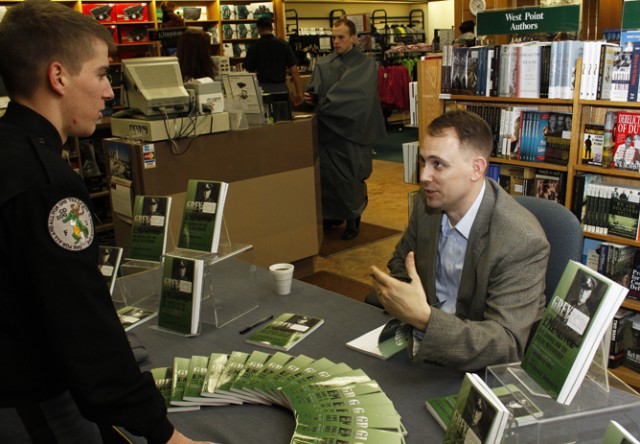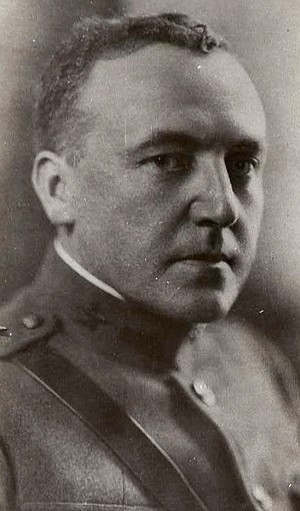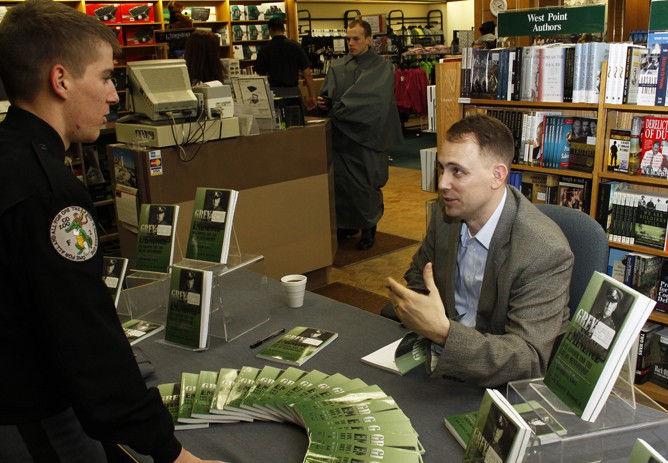WEST POINT, N.Y. (MARCH 2, 2011) -- When Maj. Ed Cox was a captain, only a few years after graduating from West Point, he began reading the biographies of great Army leaders.
In the books of Gen. George Patton, Gen. Dwight D. Eisenhower, George C. Marshall, the name Fox Conner would grab the young officer's attention. It seemed Conner was only an anecdotal figure in the lives of greater men, yet one who had tremendous impact in U.S. military history.
"I kept looking for his biography because I wanted to learn more about his life but couldn't find it," Cox said. "It didn't exist. That made me mad, and I thought somebody should write his book and if nobody was going to do it then I would."
It was nearly a decade ago when Cox made this declaration to his wife while stationed at Fort Hood, Texas, and it would not be an easy endeavor. After all, this would be the definitive story of a fellow West Point graduate, albeit a century between class years. Conner helped shape the careers of Patton and Eisenhower and had all but removed himself from historical reference.
"Conner actually had his aide burn all of his papers and journals," Cox said. "I think for some reason he didn't want a book to be written about him."
So in a sort of reverential defiance to the unheralded general, Cox culled enough research to publish the biography called "Grey Eminence: Fox Conner and the Art of Mentorship." The assistant professor of American Politics, Public Policy and Strategy in the Department of Social Sciences is not only proud to have penned the first book on Conner, but to clarify some discrepancies about the master strategist's career.
"It's frequently mentioned that he didn't rank high enough at West Point to be commissioned a cavalry officer, and so he became an artilleryman," Cox said. But researching his class I found no one had branched cavalry because at the time the Army had a greater need for artillery officers. It's these little inaccuracies I wanted to make right."
Cox said Conner's story is about mentorship which contains a valuable study on officership that senior leaders can benefit from reading. But it's the first chapter that may inspire current and future West Point cadets.
"I decided that part of my motivation was for this to be for cadets because at the heart of it, Conner was just an average cadet," Cox said. "He ranked in the middle of his class and was in trouble more often than not, and had no intention of being that lifelong learner-that professional-that we teach cadets here to be. When he became a lieutenant he worked for some leaders who motivated and inspired him, and he passed that on to his protAfAgAfAs."
Cox said plenty of books on mentorship exist, but Conner's life story reveals a unique style of mentorship.
"One of the things I strived to bring out in this book is his personal connection to his protAfAgAfAs," Cox said. "There was never a 'one size fits all' approach to leader development. He really took into account the individual's personality, strengths and weaknesses to tailor how he would develop each of them. But then you also see the personal attachment that they had for him, and he had for them, which I think a lot of good can be done if people realize that aspect of mentorship."
The title, "Grey Eminence" is not a reference to the Long Gray Line, Cox pointed out, but was the moniker given to Cardinal de Richelieu's deputy who served greatly behind-the-scenes for the bishop during diplomatic negotiations.
"If you had to sum up Fox Conner's life, I would describe him as a career officer who cared enough about his profession to pass on that love to his protAfAgAfAs," Cox said.
Marshall once recommended Conner to publish his experience on Gen. John J. Pershing's staff during World War I. Conner considered it, but declined to author the book.
"All of the intrigue and in-fighting that happened behind closed doors was going to come out," Cox said. "That caused Conner to reflect and he ultimately decided not to write the book, and I think, in part, that's why he didn't write an autobiography."
His wife, Bug, however wrote her own memoir, which proved to be a great resource for Cox.
"That book was the closest I could find to telling Conner's story," Cox said. "It's really a story about her life with the general, and so all the important details to a military historian were still missing."
This all-important book was available in "the library of last resort," Cox said, referring to the Library of Congress in Washington, D.C.
"I had to demonstrate to them that I had exhausted all other possible avenues, that the book didn't exist anywhere else," Cox said. "There was nowhere else I could get the book. When I made that case, they lent me the book."
The lack of reference material allowed Cox to tell Conner's biography with a rich narrative to captivate readers. Cox vividly recreates the first meeting between Conner and Patton, both junior officers at the time, during a chance meeting on a train headed to Fort Riley, Kan. The opening passage reveals a burgeoning friendship and the first of many lessons about Conner who "transformed lectures into conversations of equals."
"Just about every officer I know is also a student of military history, and so I read a lot of these biographies and have admired the way these writers can make history come alive," Cox said. "I didn't want this to be a 600-page book that sits on the shelf and no one reads. It's small enough to read on a plane ride and pass along to a friend."
Cox admits there are still a few unknowns left in the life of Fox Conner, especially his childhood years, which the author still wants to know. His book refers to Conner's influence in getting Eisenhower relieved from duty as Army football coach at Camp Meade to join him in Panama.
There's more to this tale, Cox said, then what is available from the Eisenhower archives and he is particularly interested in the commanding officer's side of the story.
"Maybe from an institutional or bureaucratic point of view Eisenhower's boss was right to say he wasn't prepared to leave and hadn't been to the prerequisite schools," Cox said. "That's something I'd like to look into."
Perhaps in a second edition'
"Maybe. I've thought about it," Cox said. "I have some other books in mind, but not on history. I have to take a break from that."
Cox said he'd be interested in writing a travel book for Families.
"I've noticed that almost all of them are written about traveling alone, and I travel with my wife and sons which is a whole different experience," Cox said. "It would be interesting to write one about family travel. I'm also interested, as an Army brat, to write something that younger generations of Army brats could identify with."
Facts on Fox Conner:
--Born in Slate Spring, Miss., on Nov. 2, 1874, Fox Conner entered the United States Military Academy at West Point in 1894.
--When he graduated from West Point in April 1898, he was 17th in a class of 59 and had earned 384 demerits along the way.
--Though ranked low in foreign languages at West Point, Conner would teach himself French, German and Spanish. He later served as Gen. Pershing's interpreter during the Armistice negotiations.
--His graduating class at West Point had a higher percentage of general officers (37.2%) than the famed class of 1915, "the class the stars fell on" (35.9%).
--Fox Conner was once described by Dwight D. Eisenhower as "the ablest man I ever knew."
--It's been said Conner's greatest disappointment was that he never had the opportunity to lead troops in wartime. Conner was considered too valuable a staff officer to be released into the field.
--Conners is said to have introduced the tank to Gen. George Patton, inspired Gen. Dwight D. Eisenhower to become a student of military history and strategy and contributed his expertise that George C. Marshall employed in organizing allied commands.
(Information culled from "Grey Eminence: Fox Conner and the Art of Mentorship.")




Social Sharing